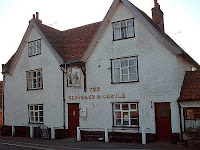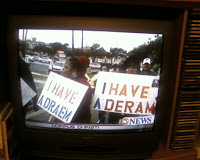
I was stationed in England from March 1967 to September 1971. I look at that time as a gift from the USAF. What a time it was! I saw so many beautiful places and met so many wonderful people.
I remember the first night in the barracks watching the telly with my 2 room-mates. One of them (let's call him John) was commenting on a news story. The story mentioned the town of Ipswich, Suffolk. "Typical *%&&$ bloke", he said.
"What do you mean?"
"Ipswich, Suffolk? How stupid. Just say Ipswich."
"Where are you from John?"
"Nashua, New Hampshire. Why?"
"How stupid! Why not just say Nashua?"
The conversation went downhill from there. This expert on all things British had been there for a whole two weeks. And for the remaining 3 years of his tour of duty he never once left the base to see this wonderful country he was living in. How truly sad.
I got off base as much as I could and saw quite a bit of this country. Surprisingly, one of the neatest places I found was less that a mile from the main gate. In a little town named Eyke (It's in Suffolk, John) there was a pub called "The Elephant & Castle". I spent many a night there and for the last year I was in England I rented a room upstairs. There was a lady artist that came in on occasion and she drew me and pen and ink picture of the pub that I eventually had many people sign. I still have it today and I still treasure it.
The owners of the pub (publicans) were Les and Ann Wallace. They, along with their daughters (Yes! PY Wallace - Yvonne - I remember you!) ran the pub each night with occasional assistance from a gentleman named Alan Varley. My mates and I never went in there as arrogant visitors but as folks just out to share a pint or two with the locals. Probably the wildest thing we ever did was to "re-tile the ceiling" We discovered that a British penny (then about the size of a fifty-cent piece) would stick quite nicely to the ceiling when properly applied. That meant dipping the coin into a pint and then snapping it flat against the ceiling. It stuck there quite nicely! We proceeded each night in our quest to cover the entire ceiling. Mr. Wallace's only comment (through a small smirk) was that "when they fall, they fall into my pocket". One particularly cold winter night one of the pennies leaped for its freedom and landed noisily on the floor. Others saw this bolt of courage and followed suit. Soon we were singing "Pennies From Heaven" amid a shower of copper and Mr. Wallace was about a pound richer.
I had a deep respect for Mr. Wallace that grew into a warm friendship. We enjoyed talking with each other and laughingly played with the differences between American and British English. I still laugh as I recall the day we went outside and he asked me to "pop the boot and grab a spanner whilst he lifted the bonnet so as to tighten a bolt holding the wing". When I stopped laughing he explained that he wanted me to go into the trunk and get a wrench while he lifted the hood to tighten a bolt that held the fender on. We also discussed the difference between kerb and curb. But the funniest of these word and expression exchanges happened the first night I stayed in my rented room upstairs. The pub had closed and I was making my way upstairs when Mr. Wallace called after me - "Would you like me to knock you up in the morning?". I laughed so hard I almost fell down the stairs and then Mr. Wallace started laughing so hard he almost fell up them. When we calmed down he patiently explained that he merely wanted to know if he should knock on my door to get me up in the morning.
I rarely called Mr. Wallace Les. He invited me to but I just felt more comfortable with Mr. Wallace. Perhaps this little story is part of the reason.
One night Les and Ann had decided to go to the movies. Mr. Wallace was a huge fan of westerns. He knew every John Wayne, Richard Widmark, Alan Ladd, Gary Cooper or Glenn Ford movie ever made. So Alan Varley took over the pub and off went Les and Ann. About 45 minutes later they were back and Mr. Wallace was incensed to say the least. I had never seen him like this - he was furious and ranting and raving. The movie they went to see? "Midnight Cowboy".
Les and Ann Wallace are no longer with us. But I treasure their friendship as much today as I did back then. They were two jewels that glistened in this life and for that I am very privileged.

